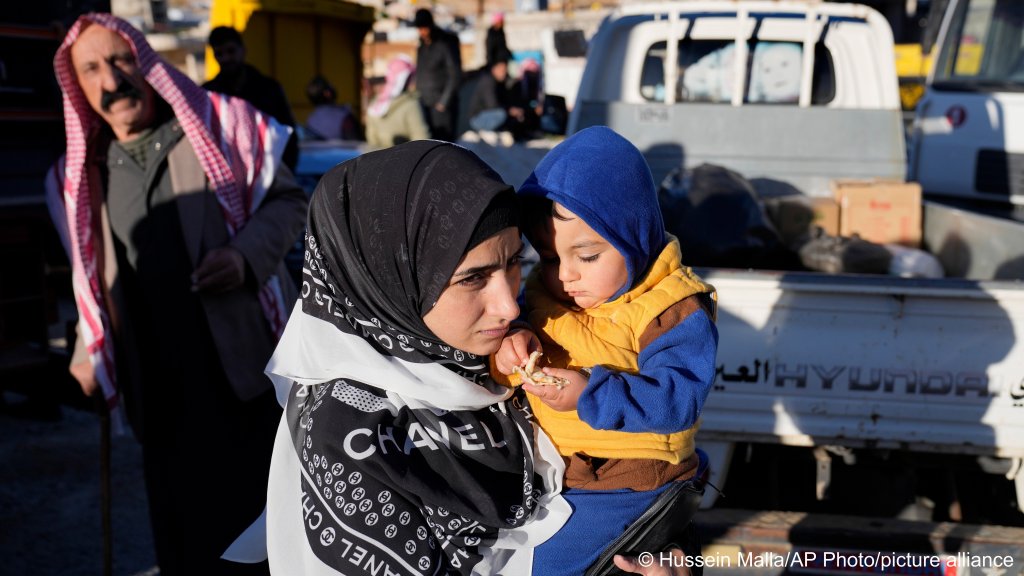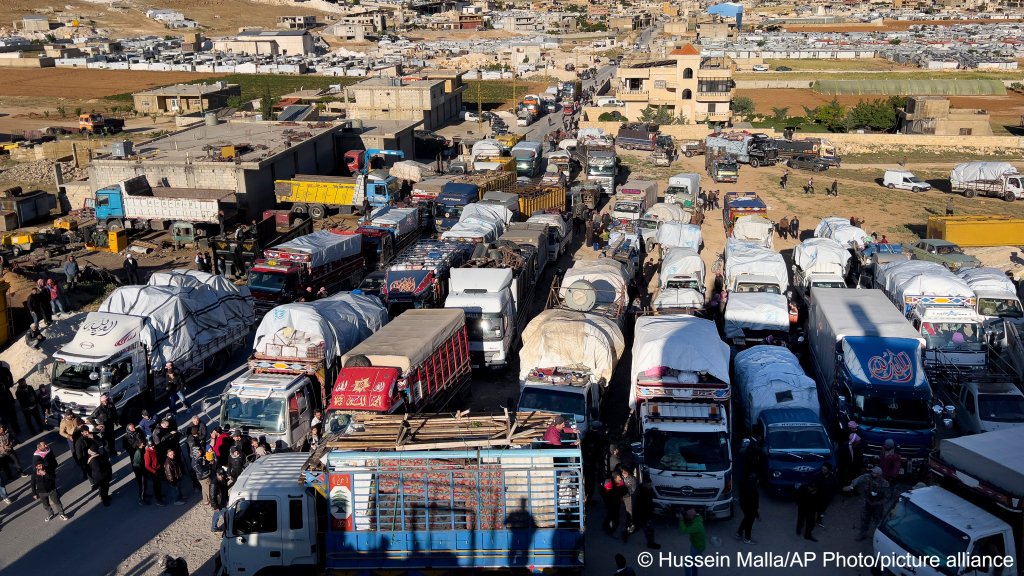About 330 Syrians left Lebanon for their home country on Tuesday amid growing anti-refugee tension. The returnees reportedly volunteered to leave, but activists worry that Syrians are being pressured to return to a country that is still not safe.
On Tuesday (March 12) a convoy of vans and trucks, carrying around 330 Syrian refugees and their belongings, headed from northeastern Lebanon to Syria. The transfer from the town of Arsal and another nearby town was organized by Lebanese and Syrian authorities.
Some Syrians returnees are hopeful, others scared
Some of the people returning expressed hope and happiness about their return to reporters, while others were worried about Syria being unsafe for them and their families.
"I'm looking forward to returning to my house in my village. It's better to sleep in a house with a roof than in a tent," one woman told news agency dpa. She had been living in a refugee camp in Arsal for 14 years and was returning with her two daughters and granddaughters.
A 57-year-old man told news agency AFP that he was "happy to go back to my country after ten years." He said that he was going back by himself for now, in order to prepare everything for his family's return.
One woman who expressed less hope about the future in Syria told dpa: "It's a nightmare. I'm afraid of what will happen to my son and myself. He will definitely be drafted into military service."

This was the first such convoy since 2022 when Lebanon initially announced plans to return 15,000 Syrians back home each month. However, NGOs including Amnesty International and Human Rights Watch report that summary deportations have been occurring since then.
Also read: Lebanon under scrutiny for deporting Syrian refugees
Tension growing between Lebanese and Syrian people
According to Lebanese state officials, all Syrians who returned home on Tuesday had signed up voluntarily.
But some human rights organizations have warned that Lebanese authorities may be pressuring or forcing Syrians to return home.
Ahead of the convoy's departure, Amnesty International said on Monday that the voluntary nature of the returns should be questioned.
"Lebanon has adopted a series of restrictive policies designed to pressure refugees to return to Syria, including restrictions on residency, work, and movement. Such restrictions raise concerns about refugees' ability to provide free and informed consent," the organization said in Arabic on X (formerly Twitter).
Last month, Human Rights Watch (HRW) said that "Lebanese authorities have arbitrarily detained, tortured, and forcibly returned Syrians to Syria in recent months, including opposition activists and army defectors."
News outlet Syria Direct on Tuesday reported that hundreds of Syrians had been evicted in Lebanon and that thousands more faced potential evictions.
Lebanon, a small country bordering Syria, hosts the largest per capita refugee population in the world, according to UN refugee agency UNHCR. It has a population of about 6 million people and hosts an estimated 1.5 million Syrian refugees. For years, the country has been in a severe economic crisis; many Lebanese and Syrian people are struggling to get by.
Recently, anti-refugee sentiments have surged in the country, with several political leaders calling for Syrians to return home.
But is it safe to return to Syria?
Many Syrian refugees believe that their home country is still not safe to return to, as do many international human rights organizations.
"By facilitating [...] returns, the Lebanese authorities are deliberately exposing Syrian refugees to the risk of serious human rights violations," Amnesty said on Monday.
"Syrian security forces and government-affiliated militias arbitrarily detain, torture, disappear and kill refugees who return [because of a] perceived affiliation with the opposition simply based on individuals’ decisions to leave the country and seek refuge elsewhere," HRW, Amnesty and six other rights organizations said in a joint statement published earlier this month.
Young men also face compulsory military service for the regime of Bashar Assad in Syria.

EU signed deal with Lebanon to prevent migration
A growing number of Syrian refugees has recently tried to escape poverty and anti-refugee sentiments in Lebanon by trying to reach Europe, specifically the island of Cyprus. The small European Union member country is located less than 200 kilometers from the nearest Lebanese shores.
In response, the EU recently struck a deal with Lebanon, promising the country some €1 billion in aid with the goal of stopping refugees from crossing the Mediterranean.
While advocates have praised more funding being made available to support refugees in Lebanon, critics of the deal worry that it could lead to more Syrians being forced to return, and forced pullbacks at Lebanon's shores.
"[M]igration cooperation deals negotiated by the EU [...] expose individuals to human rights risks, erode asylum protection and undermine the international protection system as a whole," Amnesty, HRW and other rights organizations said of the deal in their statement published in early May.
